- Home
- Pam Jenoff
The Orphan's Tale
The Orphan's Tale Read online
A powerful novel of friendship set in a traveling circus during World War II, The Orphan’s Tale introduces two extraordinary women and their harrowing stories of sacrifice and survival
Sixteen-year-old Noa has been cast out in disgrace after becoming pregnant by a Nazi soldier and being forced to give up her baby. She lives above a small rail station, which she cleans in order to earn her keep... When Noa discovers a boxcar containing dozens of Jewish infants bound for a concentration camp, she is reminded of the child that was taken from her. And in a moment that will change the course of her life, she snatches one of the babies and flees into the snowy night.
Noa finds refuge with a German circus, but she must learn the flying trapeze act so she can blend in undetected, spurning the resentment of the lead aerialist, Astrid. At first rivals, Noa and Astrid soon forge a powerful bond. But as the facade that protects them proves increasingly tenuous, Noa and Astrid must decide whether their friendship is enough to save one another—or if the secrets that burn between them will destroy everything.
Praise for the novels of Pam Jenoff
“A beautiful story of love and redemption about a woman struggling to find her voice and her way amidst the turmoil of World War II.”
—Kristin Hannah, #1 New York Times bestselling author of The Nightingale
“When it comes to bringing an era to life, this author has no peer.”
—Susan Wiggs, #1 New York Times bestselling author
“Heartfelt, stirring... Definitely one for my keeper shelf.”
—Karen White, New York Times bestselling author
“A warm and heartfelt story of emotional survival.”
—Diane Chamberlain, USA TODAY bestselling author
“The kind of book that absorbs you from the beginning and doesn’t let go.”
—Beatriz Williams, New York Times bestselling author
“Powerfully and emotionally written.... This is a book you’ll want to read more than once.”
—RT Book Reviews, 4.5 stars
“Fans of Kate Morton and Alyson Richman should reach for Jenoff’s latest.”
—Booklist
“Atmospheric, tender, and as realistic as any Holocaust survivor testimony, The Winter Guest is a must-read.”
—Jenna Blum, New York Times bestselling author
“[Told with] luminous simplicity.... [The Kommandant’s Girl] is historical romance at its finest.”
—Publishers Weekly, starred review
Pam Jenoff is the author of several novels of historical fiction, including the international bestseller The Kommandant’s Girl. She holds a bachelor’s degree in international affairs from George Washington University and a master’s degree in history from Cambridge, and she received her Juris Doctor from the University of Pennsylvania. Jenoff’s novels are inspired by her experiences working at the Pentagon and also as a diplomat for the State Department handling Holocaust issues in Poland. She lives with her husband and three children near Philadelphia where, in addition to writing, she teaches law school.
www.PamJenoff.com
The Orphan’s Tale
Pam Jenoff
For my family.
Contents
Prologue
Chapter 1
Chapter 2
Chapter 3
Chapter 4
Chapter 5
Chapter 6
Chapter 7
Chapter 8
Chapter 9
Chapter 10
Chapter 11
Chapter 12
Chapter 13
Chapter 14
Chapter 15
Chapter 16
Chapter 17
Chapter 18
Chapter 19
Chapter 20
Chapter 21
Chapter 22
Chapter 23
Chapter 24
Chapter 25
Chapter 26
Chapter 27
Epilogue
Author’s Note
Acknowledgments
The Orphan’s Tale Reader’s Guide
Questions for Discussion
A Conversation with Pam Jenoff
Excerpt from The Kommandant’s Girl by Pam Jenoff
Prologue
Paris
They will be looking for me by now.
I pause on the granite steps of the museum, reaching for the railing to steady myself. Pain, sharper than ever, creaks through my left hip, not perfectly healed from last year’s break. Across the Avenue Winston Churchill, behind the glass dome of the Grand Palais, the March sky is rosy at dusk.
I peer around the edge of the arched entranceway of the Petit Palais. From the massive stone columns hangs a red banner two stories high: Deux Cents ans de Magie du Cirque—Two Hundred Years of Circus Magic. It is festooned with elephants, a tiger and a clown, their colors so much brighter in my memories.
I should have told someone I was going. They would have only tried to stop me, though. My escape, months in the planning since I’d read about the upcoming exhibit in the Times, had been well orchestrated: I had bribed an aide at the nursing home to take the photo I needed to mail to the passport office, paid for the plane ticket in cash. I’d almost been caught when the taxicab I’d called pulled up in front of the home in the predawn darkness and honked loudly. But the guard at the desk remained asleep.
Summoning my strength now, I begin to climb again, taking each painful step one by one. Inside the lobby, the opening gala is already in full swing, clusters of men in tuxedos and women in evening gowns mingling beneath the elaborately painted dome ceiling. Conversations in French bubble around me like a long-forgotten perfume I am desperate to inhale. Familiar words trickle back, first in a stream then a river, though I’ve scarcely heard them in half a century.
I do not stop at the reception desk to check in; they are not expecting me. Instead, dodging the butlered hors d’oeuvres and champagne, I make my way along the mosaic floors, past walls of murals to the circus exhibit, its entrance marked by a smaller version of the banner outside. There are photos blown up and hung from the ceiling by wire too fine to see, images of a sword swallower and dancing horses and still more clowns. From the labels below each picture, the names come back to me like a song: Lorch, D’Augny, Neuhoff—great European circus dynasties felled by war and time. At the last of these names, my eyes begin to burn.
Beyond the photos hangs a tall, worn placard of a woman suspended from silk ropes by her arms, one leg extended behind her in a midair arabesque. Her youthful face and body are barely recognizable to me. In my mind, the song of the carousel begins to play tinny and faint like a music box. I feel the searing heat of the lights, so hot it could almost peel off my skin. A flying trapeze hangs above the exhibit, fixed as if in midflight. Even now, my almost ninety-year-old legs ache with yearning to climb up there.
But there is no time for memories. Getting here took longer than I thought, like everything else these days, and there isn’t a minute to spare. Pushing down the lump in my throat, I press forward, past the costumes and headdresses, artifacts of a lost civilization. Finally, I reach the railcar. Some of the side panels have been removed to reveal the close, tiny berths inside. I am struck by the compact size, less than half my shared room at the nursing home. It had seemed so much larger in my mind. Had we really lived in there for months on end? I reach out my hand to touch the rotting wood. Though I had known the railcar was the
same the minute I had seen it in the paper, some piece of my heart had been too afraid to believe it until now.
Voices grow louder behind me. I glance quickly over my shoulder. The reception is breaking up and the attendees drawing closer to the exhibit. In a few more minutes, it will be too late.
I look back once more, then crouch to slip beneath the roped stanchion. Hide, a voice seems to say, the long-buried instinct rising up in me once more. Instead, I run my hand under the bottom of the railcar. The compartment is there, exactly as I remembered. The door still sticks, but if I press on it just so... It snaps open and I imagine the rush of excitement of a young girl looking for a scribbled invitation to a secret rendezvous.
But as I reach inside, my fingers close around cold, dark space. The compartment is empty and the dream I had that it might hold the answers evaporates like cool mist.
1
Noa
Germany, 1944
The sound comes low like the buzzing of the bees that once chased Papa across the farm and caused him to spend a week swathed in bandages.
I set down the brush I’d been using to scrub the floor, once-elegant marble now cracked beneath boot heels and set with fine lines of mud and ash that will never lift. Listening for the direction of the sound, I cross the station beneath the sign announcing in bold black: Bahnhof Bensheim. A big name for nothing more than a waiting room with two toilets, a ticket window and a wurst stand that operates when there is meat to be had and the weather is not awful. I bend to pick up a coin at the base of one of the benches, pocket it. It amazes me the things that people forget or leave behind.
Outside, my breath rises in puffs in the February night air. The sky is a collage of ivory and gray, more snow threatening. The station sits low in a valley, surrounded by lush hills of pine trees on three sides, their pointed green tips poking out above snow-covered branches. The air has a slightly burnt smell. Before the war, Bensheim had been just another tiny stop that most travelers passed through without noticing. But the Germans make use of everything it seems, and the location is good for parking trains and switching out engines during the night.
I’ve been here almost four months. It hadn’t been so bad in the autumn and I was happy to find shelter after I’d been sent packing with two days’ worth of food, three if I stretched it. The girls’ home where I lived after my parents found out I was expecting and kicked me out had been located far from anywhere in the name of discretion and they could have dropped me off in Mainz, or at least the nearest town. They simply opened the door, though, dismissing me on foot. I’d headed to the train station before realizing that I had nowhere to go. More than once during my months away, I had thought of returning home, begging forgiveness. It was not that I was too proud. I would have gotten down on my knees if I thought it would do any good. But I knew from the fury in my father’s eyes the day he forced me out that his heart was closed. I could not stand rejection twice.
In a moment of luck, though, the station had needed a cleaner. I peer around the back of the building now toward the tiny closet where I sleep on a mattress on the floor. The maternity dress is the same one I wore the day I left the home, except that the full front now hangs limply. It will not always be this way, of course. I will find a real job—one that pays in more than not-quite-moldy bread—and a proper home.
I see myself in the train station window. I have the kind of looks that just fit in, dishwater hair that whitens with the summer sun, pale blue eyes. Once my plainness bothered me; here it is a benefit. The two other station workers, the ticket girl and the man at the kiosk, come and then go home each night, hardly speaking to me. The travelers pass through the station with the daily edition of Der Stürmer tucked under their arms, grinding cigarettes into the floor, not caring who I am or where I came from. Though lonely, I need it that way. I cannot answer questions about the past.
No, they do not notice me. I see them, though, the soldiers on leave and the mothers and wives who come each day to scan the platform hopefully for a son or husband before leaving alone. You can always tell the ones who are trying to flee. They try to look normal, as if just going on vacation. But their clothes are too tight from the layers padded underneath and bags so full they threaten to burst at any second. They do not make eye contact, but hustle their children along with pale, strained faces.
The buzzing noise grows louder and more high-pitched. It is coming from the train I’d heard screech in earlier, now parked on the far track. I start toward it, past the nearly empty coal bins, most of their stores long taken for troops fighting in the east. Perhaps someone has left on an engine or other machinery. I do not want to be blamed, and risk losing my job. Despite the grimness of my situation, I know it could be worse—and that I am lucky to be here.
Lucky. I’d heard it first from an elderly German woman who shared some herring with me on the bus to Den Hague after leaving my parents. “You are the Aryan ideal,” she told me between fishy lip smacks, as we wound through detours and cratered roads.
I thought she was joking; I had plain blond hair and a little stump of a nose. My body was sturdy—athletic, until it had begun to soften out and grow curvy. Other than when the German had whispered soft words into my ear at night, I had always considered myself unremarkable. But now I’d been told I was just right. I found myself confiding in the woman about my pregnancy and how I had been thrown out. She told me to go to Wiesbaden, and scribbled a note saying I was carrying a child of the Reich. I took it and went. It did not occur to me whether it was dangerous to go to Germany or that I should refuse. Somebody wanted children like mine. My parents would have sooner died than accepted help from the Germans. But the woman said they would give me shelter; how bad could they be? I had nowhere else to go.
I was lucky, they said again when I reached the girls’ home. Though Dutch, I was considered of Aryan race and my child—otherwise shamed as an uneheliches Kind, conceived out of wedlock—might just be accepted into the Lebensborn program and raised by a good German family. I’d spent nearly six months there, reading and helping with the housework until my stomach became too bulky. The facility, if not grand, was modern and clean, designed to deliver babies in good health to the Reich. I’d gotten to know a sturdy girl called Eva who was a few months further along than me, but one night she awoke in blood and they took her to the hospital and I did not see her again. After that, I kept to myself. None of us would be there for long.
My time came on a cold October morning when I stood up from the breakfast table at the girls’ home and my water broke. The next eighteen hours were a blur of awful pain, punctuated by words of command, without encouragement or a soothing touch. At last, the baby had emerged with a wail and my entire body shuddered with emptiness, a machine shutting down. A strange look crossed the nurse’s face.
“What is it?” I demanded. I was not supposed to see the child. But I struggled against pain to sit upright. “What’s wrong?”
“Everything is fine,” the doctor assured. “The child is healthy.” His voice was perturbed, though, face stormy through thick glasses above the draped cream sheet. I leaned forward and a set of piercing coal eyes met mine.
Those eyes that were not Aryan.
I understood then the doctor’s distress. The child looked nothing like the perfect race. Some hidden gene, on my side or the German’s, had given him dark eyes and olive skin. He would not be accepted into the Lebensborn program.
My baby cried out, shrill and high-pitched, as though he had heard his fate and was protesting. I had reached for him through the pain. “I want to hold him.”
The doctor and the nurse, who had been recording details about the child on some sort of form, exchanged uneasy looks. “We don’t, that is, the Lebensborn program does not allow that.”
I struggled to sit up. “Then I’ll take him and leave.” It had been a bluff; I had nowhere to go. I had sign
ed papers giving up my rights when I arrived in exchange for letting me stay, there were hospital guards... I could barely even walk. “Please let me have him for a second.”
“Nein.” The nurse shook her head emphatically, slipping from the room as I continued to plead.
Once she was out of sight, something in my voice forced the doctor to relent. “Just for a moment,” he said, reluctantly handing me the child. I stared at the red face, inhaled the delicious scent of his head that was pointed from so many hours of struggling to be born and I focused on his eyes. Those beautiful eyes. How could something so perfect not be their ideal?
He was mine, though. A wave of love crested and broke over me. I had not wanted this child, but in that moment, all the regret washed away, replaced by longing. Panic and relief swept me under. They would not want him now. I’d have to take him home because there was no other choice. I would keep him, find a way...
Then the nurse returned and ripped him from my arms.
“No, wait,” I protested. As I struggled to reach for my baby, something sharp pierced my arm. My head swam. Hands pressed me back on the bed. I faded, still seeing those dark eyes.
I awoke alone in that cold, sterile delivery room, without my child, or a husband or mother or even a nurse, an empty vessel that no one wanted anymore. They said afterward that he went to a good home. I had no way of knowing if they were telling the truth.
I swallow against the dryness of my throat, forcing the memory away. Then I step from the station into the biting cold air, relieved that the Schutzpolizei des Reiches, the leering state police who patrol the station, are nowhere to be seen. Most likely they are fighting the cold in their truck with a flask. I scan the train, trying to pinpoint the buzzing sound. It comes from the last boxcar, adjacent to the caboose—not from the engine. No, the noise comes from something inside the train. Something alive.
I stop. I have made it a point to never go near the trains, to look away when they pass by—because they are carrying Jews.

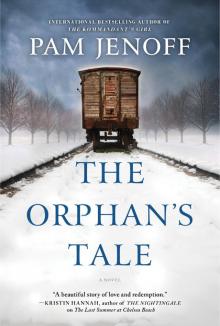 The Orphan's Tale
The Orphan's Tale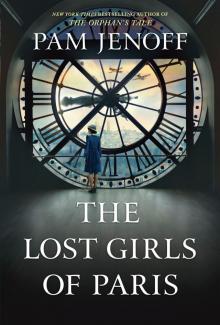 The Lost Girls of Paris
The Lost Girls of Paris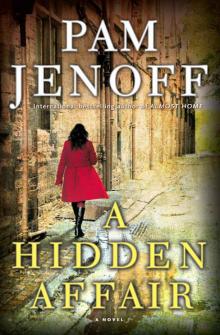 A Hidden Affair: A Novel
A Hidden Affair: A Novel The Last Embrace
The Last Embrace Almost Home: A Novel
Almost Home: A Novel A Hidden Affair
A Hidden Affair Almost Home
Almost Home The Winter Guest
The Winter Guest The Last Summer at Chelsea Beach
The Last Summer at Chelsea Beach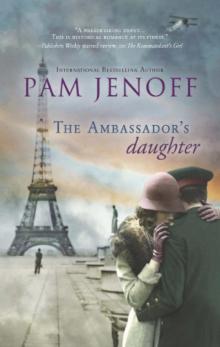 The Ambassador's Daughter
The Ambassador's Daughter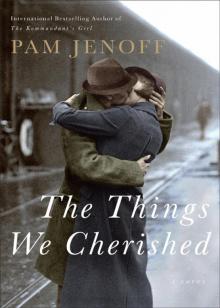 The Things We Cherished
The Things We Cherished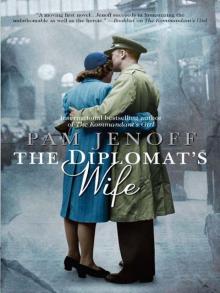 The Diplomat's Wife
The Diplomat's Wife The Kommandant's Girl
The Kommandant's Girl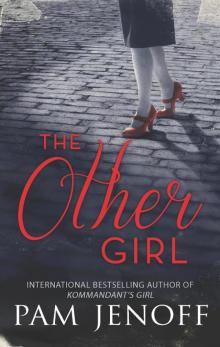 The Other Girl
The Other Girl